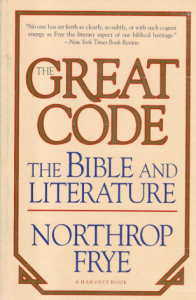
Responding to Matthew Griffin:
Matthew, I have just re-read my post, and realized that it is really about two quite different but related topics, and what is at the root of both is (here I brace myself, realizing that I am probably going provoke a flurry of responses) my ambivalent response to The Great Code. I have read and re-read the book, and have thought about it during what are now many sections of a second-year course on the Bible and Literature. For me, the problem is that for the purposes of teaching that course, the book is not literary enough, and not enough concerned with the different faith traditions of the English writers who are especially biblical. Of course, I know that was not Frye’s intention or his method, but nevertheless, I find myself relying more on Robert Alter, or on David Jeffrey’s Dictionary of Biblical Tradition. Whereas on the other hand if I were to consider The Great Code as a spiritual guide, it is too literary, not enough concerned with the traditions of Christian exegesis and spirituality. I also find Frye’s treatment of Judaism is sometimes problematic.
I consider myself very sympathetic to Frye in many ways, having spent a good part of the last fifteen years reading his works and writing about them, but in regards to his writings on religion I always come back to the feeling that they are limited by his idiosyncratic personal development of a radical dissenting tradition. I recognize the intellectual power of that tradition, having been raised within a similar one myself. No doubt many of my difficulties with Frye’s writings on religion arise from the fact that I now occupy a rather different position.
Ultimately it comes down to a question of experience: you and Clayton Chrusch obviously find Frye more valuable as a religious teacher than I do, and that is not something it would be very helpful to argue about.
The more general point I was trying to make in my original post is that I think Frye’s religious concerns hastened the reaction against his work in the secular critical climate of the 1980s. Now that religion is no longer such a taboo subject in intellectual circles, I think there are in Frye’s writing on religion various obstacles that hinder those from certain traditions from an easy access to his work.
